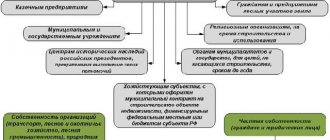Permanent (indefinite) use of a land plot is a limited property (property) right (Articles 216, 268 of the Civil Code of the Russian Federation).
Persons who own and use land plots on the right of permanent (perpetual) use or on the right of free use are called land users by the RF Land Code (paragraph 3, clause 3, article 5 of the RF Land Code). The land user has the right, unless otherwise provided by law, to independently use the site for the purposes for which it is provided, including the construction of buildings, structures and other real estate on the site for these purposes. Buildings, structures, and other real estate created by this person for himself are his property.
Ownership and use of land on the right of permanent (perpetual) use
The subject of the right of permanent (perpetual) use of a land plot is endowed with the powers of ownership and use of a land plot within the limits established by regulatory legal acts, as well as an individual act on the provision of a land plot. The capabilities of the subject are established by Art. 41 of the Land Code of the Russian Federation, according to which persons who are not owners of land plots exercise the rights of owners of land plots established by Art. 40 of the RF Land Code for owners.
Landowners who have land plots with the right of permanent (indefinite) use cannot dispose of them, including transferring them for rent or free-term use, even with the consent of the owner of the land plot, with the exception of two cases established by clause 3 of Art. 269 Civil Code of the Russian Federation:
- concluding an agreement on the establishment of an easement (in this case, the land plot does not leave the sphere of economic dominance of the land user and continues to be used by him for its intended purpose);
- transfer of a land plot for free use to a citizen in the form of a service allotment in accordance with clause 2 of Art. 24 Land Code of the Russian Federation.
Why is the “dacha amnesty” being slowed down?
The fact is that in order to register ownership of a dacha or garage plot, it is required, in addition to any title document, to also provide a cadastral plan of the plot in two copies. The cost and duration of cadastral work became the main factor that made citizens less susceptible to the bright possibilities of the “dacha amnesty.”
In addition, at least some kind of title document for the plot must be provided. It could be an act on the provision of a plot of land for permanent use, any decree/order/decision on the provision of a plot of land, and finally an extract from the household register. However, most gardeners and summer residents do not have any documents, except, perhaps, gardener's books.
All these circumstances slow down the process, forcing the authorities to invent new incentives for the population, such as the so-called new dacha amnesty.
Re-registration of the right of permanent (indefinite) use of land plots by citizens
Citizens have the right to re-register the right of permanent (indefinite) use of a land plot to ownership. This is possible in relation to a plot provided before the entry into force of the Land Code of the Russian Federation (October 30, 2001) for personal subsidiary plots, dacha farming, vegetable gardening, horticulture, individual garage or housing construction.
The period for re-registration is not limited by law. In accordance with paragraph 3 of Art. 3 of the Law “On the Enactment of the Land Code of the Russian Federation” registration of ownership of land plots previously provided to them for permanent (indefinite) use, lifelong inheritable possession in the cases established by land legislation, as well as re-registration of rights to land plots provided for permanent ( unlimited) use by state or municipal unitary enterprises, not limited by period.
The ownership of such plots can also be registered by citizens to whom the ownership of the buildings (structures) located on them has been transferred by inheritance or on other grounds.
An exception is cases when a land plot cannot be provided for private ownership, for example, due to its limited circulation (for example, land plots from the forest fund lands).
"Dacha amnesty"
Since, after several years had passed since the adoption of the Land Code of the Russian Federation, the process of citizens registering their ownership of land plots in their use had clearly not acquired the required scope, and the state needed to expand the base for collecting land tax, it was decided to simplify the procedure for such registration and set it out in special law. It was adopted in 2006 and was popularly called the “dacha amnesty.” It made it possible to register ownership under a simplified procedure not only of dacha and garage land plots that were in permanent use, but also of houses and garages on them.
The deadline for completing the “dacha amnesty” was repeatedly extended. The last time this was done was already this year. The final date for its implementation is set until March 1, 2018.
Re-registration of the right to permanent (perpetual) use of land plots by legal entities
Legal entities , with the exception of those specified in paragraph 2 of Art. 39.9 of the Land Code of the Russian Federation, legal entities were obliged to re-register land plots at their own request for rent or ownership until January 2012, and land plots on which linear objects are located (power lines, communication lines, pipelines, roads and railway lines, etc. ), - until January 2021 (clause 2 of article 3 of the law “On the entry into force of the Land Code of the Russian Federation”). That is, legal entities had the opportunity to choose the right to land: ownership or lease.
On the one hand, the forced procedure for re-registration of the right to a land plot involves a person’s choice of the acquired right (ownership or lease). On the other hand, the legislation provides for negative consequences for failure to fulfill the obligation to re-register such a right in the form of administrative liability, as well as the need to pay rent in the usual amount, without benefits:
- in accordance with Art. 7.34 of the Code of Administrative Offenses of the Russian Federation, the use of a land plot with the right of permanent (indefinite) use by a legal entity that has not fulfilled the obligation to re-register such a right within the prescribed period is punishable. This offense is ongoing, as a result of which the statute of limitations for bringing to justice begins to be calculated from the date of discovery of the administrative offense. This legal position was defined in paragraph 37 of the Review of Judicial Practice of the Supreme Court of the Russian Federation No. 5 (2017), approved. by the Presidium of the Supreme Court of the Russian Federation on December 27, 2017);
- if a person has acquired ownership of a building located on a land plot granted to the seller on the right of permanent (perpetual) use, and has not re-registered this right of ownership or lease right before July 1, 2012, he is obliged to pay for the actual use of the land plot in the amount rent on the basis of regulatory legal acts of a constituent entity of the Russian Federation (clause 17 of the Review of judicial practice of the Supreme Court of the Russian Federation No. 1 (2018), approved by the Presidium of the Supreme Court of the Russian Federation on March 28, 2018). This means that the preferential rental rate does not apply to such persons.
The right of permanent (unlimited) use does not terminate after July 1, 2012. This follows from Art. 45 of the RF Land Code, which lists the grounds for termination of rights.
If the right of permanent (indefinite) use was not re-registered within the period specified in the law, this can be done at the present time.
Arbitrage practice
Having analyzed the judicial practice, we can conclude that there are often claims when the applicant wants to cancel the contract of sale of a house located on a plot of lifelong ownership, justifying his claims by the impossibility of disposing of the property in this way.
After all, according to the law, it is impossible to sell property that is in lifelong ownership. But the applicant is mistaken; the rule applies exclusively to the site. Structures erected on the territory are permitted to be sold. This is confirmed in practice.
In the city of Sochi, a citizen filed a lawsuit in the Khostinsky District Court with the aim of invalidating the purchase and sale agreement of a private house, which is located on his plot, transferred to him for lifelong use. The court, relying on the rules of law, refused.
Procedure for terminating permanent (unlimited) use
In accordance with paragraph 1 of Art. 45 of the Land Code of the Russian Federation, the right of permanent (indefinite) use can be terminated voluntarily by submitting an application for waiver of the right by the landowner with the attachment of documents provided for in Art. 53 of the Land Code of the Russian Federation to the executive body of state power or local government body authorized to provide land plots (for citizens - copies of an identity document; for legal entities and state and municipal enterprises - a document confirming the consent of the body that created the corresponding legal entity, or other acting on behalf of the founder of the body to renounce the right of permanent (indefinite) use of a land plot), other grounds for termination of the right may be established by the legislation of the Russian Federation.
In paragraph 2 of Art. 45 of the Land Code of the Russian Federation establishes a closed list of grounds for the forced termination of the right of permanent (perpetual) use, namely in connection with the use of a land plot in violation of the requirements of the legislation of the Russian Federation (use of a plot not for its intended purpose or if its use leads to a significant decrease in the fertility of agricultural land or damage to harm to the environment; damage to land; failure to fulfill obligations for land reclamation, mandatory measures to improve land and protect soils, obligations to bring land into a state suitable for its intended purpose; failure to use a land plot intended for agricultural production or housing or other construction, within the established time limits) and when withdrawing a land plot for state or municipal needs; creation or erection of an unauthorized structure on a land plot or failure to fulfill obligations to demolish such a structure (Part 11 of Article 55.32 of the Civil Code of the Russian Federation).
Forced termination of the right to permanent (indefinite) use of a land plot on the grounds specified in paragraphs. 1 item 2 art. 45 of the Land Code of the Russian Federation (when using a land plot in violation of the requirements of the legislation of the Russian Federation), is carried out exclusively on the basis of a judicial act on the seizure of the land plot that has entered into legal force (subject to the failure to eliminate the improper use of the land plot after the imposition of an administrative penalty in the form of a fine) (clause 3 of Art. 45, Article 54 of the Land Code of the Russian Federation).
Procedure and rules for registration of rights: where to apply, necessary documents
The right of lifelong inheritable ownership is transferred by inheritance or by transaction along with the acquired real estate. In order for it to pass to the buyer, it is necessary to draw up a purchase and sale agreement for a permanent structure located on the site. The heir must enter into inheritance rights and obtain the appropriate certificate.
Registration when buying a home
The fact of purchasing a house is registered through Rosreestr . It is best to submit documentation for registration through the multifunctional center. Papers for the acquired capital structure should be included in this package. The title document for the house must contain cadastral information about the land plot - this will be enough. But they must contain reliable information about the following:
- when the site was allocated;
- by what authority was it allocated;
- form of law;
- cadastral number of the plot;
- total area.
As a result of registration, an extract from the Unified State Register of Real Estate (USRN) will be issued, where the registration authority entered the re-registered right to the land plot received when purchasing a house. The document will indicate that the form of right is lifelong inheritable ownership, and the owner of the land is an administrative body.
Passage by inheritance
When an allotment passes from a deceased landowner, there are two options:
- registration of inheritance under a will;
- receiving inheritance according to the law, in order of priority according to the degree of relationship.
A certificate of inheritance is the main document according to which the right to a plot is transferred to the heir
Entry into inheritance is formalized by a notary by submitting an application. The certificate is issued only after he has established the circle of heirs. And here there are possible options. For example, it may turn out that if there is a will, close relatives must be allocated a mandatory share. Therefore, several heirs often claim land plots. The real rights of each heir are subsequently established by an agreement, which is drawn up by all persons included in the number of recipients of the inheritance. If they do not reach agreement, then the right is established through the court.
Based on this, legal holders who inherited land along with other heirs must have one of the following documents:
- agreement of the heirs that the plot passes to the specified person;
- refusal of the remaining legal successors from the plot in favor of the specified heir;
- court decision recognizing the right.
If such a document is missing, and two or more persons are indicated in the certificate of inheritance, the land is considered common. In this case, division of the plot is allowed only with the permission of the local executive committee or after registration of the land plot in ownership with the obligatory allocation of shares.
A plot of land inherited by several persons and located in the PNV can be divided only with the consent of the administration
Obtaining municipal consent: how to draw up an application, sample
Inherited property received without a residential building in the form of one plot must not only be registered, but also be approved by the administration of the locality. After all, the owner of the land is the municipality. It is his authorized persons who must give permission to transfer the right.
To obtain such permission, you need to contact the administration of the locality with an application. The application is written to the head of the district or village administration. If the land belongs to a cadastral block located in a regional or regional center - addressed to the head of the department for land issues.
As far as I know, this form of law does not apply in federal cities. Land owned by the city municipality is leased to companies or residents of multi-storey buildings. Or they are re-registered as property.
It is recommended to write in the header the name of the administrative body where the paper is being submitted. The following is written in free form:
- A request to register a plot on the basis of lifelong inheritable ownership, indicating information about the applicant.
- Cadastral characteristics of the land plot: land category, total area, cadastral number.
- Title characteristics of the memory: by whom and when it was received, when and to whom it was inherited.
- List of attached documents.
- Applicant's signature and date of filing.
The list of attached documents includes a certificate of inheritance of the land plot and papers for the plot belonging to the former owner. If an agreement has been drawn up, you need to submit that too. If the division of property took place in court, the court decision is attached.
Administration approval comes to the MFC in writing. After receiving it, you can register the land. If a negative answer is received, it can be contested within ten days from the date of issuance of an extract from the decision of the administrative commission.
Who can receive it and on what basis?
The list of powers of persons entering into inheritance on this basis is indicated in Articles 1111 and 1181 of the Civil Code of the Russian Federation . These include:
- heirs at law;
- persons specified in the will.
In addition to legally capable and adult citizens, inheritance on a legal basis can pass to minor children. In this case, they act as copyright holders, but the package of documentation, as well as the responsible management of the site until the heir comes of age, is carried out by their legal representatives:
- parents and adoptive parents;
- guardians and trustees;
- authorized representatives of the social institutions where they reside.
The same applies to incapacitated persons, in whose interests legal representatives must act. If the land plot is transferred to two or more heirs, then it can only be registered as joint ownership, without allocating shares.
Important! When making a will for a plot, the heirs of the first priority: parents, children, spouses are allocated a mandatory share.
In addition to inheritance, citizens who have purchased residential real estate on a given site can enter into use rights, which passes along with the building as a local area.
How to purchase land in 2021?
Since there is a moratorium on the transfer of plots in the BP to individuals, they can be purchased through a regular purchase and sale transaction or rented from the local municipality. To do this, you need to contact the administration and find out if there is a free section that is allowed to be purchased as property.
The second option, concerning large families, is to stand in line for the distribution of territories from the possessions of the municipality. This is regulated by the state support program, where families with three or more children receive plots for individual housing construction.








